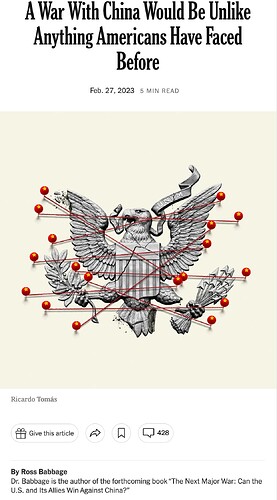-
印度洋-太平洋地区的战争现在比二战以来的任何时候都更有可能发生,而中国对台湾的入侵是最有可能的火花。
-
美国的重要利益受到威胁,包括获得世界领先的半导体和其他在台湾制造的关键部件。
-
拜登总统已经表达了保卫台湾的承诺,但华盛顿的领导人必须谨慎行事,不要不小心跌入与中国的战争。
-
中国是一个不同的敌人,是一个有能力在美国本土进行战争的军事、经济和技术大国。
-
美国面临的挑战是严重的,其公民需要更好地认识到这些挑战。
-
一个职业战略分析家和国防规划师花了几十年时间研究战争如何开始以及战争如何发展。
-
美国公民已经习惯于把他们的军队送到远离家乡的地方去作战。
-
中国的军事、经济和技术能力能够使美国本土感受到战争。
-
美国需要意识到与中国的战争可能带来的挑战。
-
中国可能发动闪电般的空中、海上和网络攻击,迅速夺取对台湾关键战略目标的控制权
-
超过1350枚弹道导弹和巡航导弹准备打击在日本、韩国、菲律宾和西太平洋的美国和盟国部队
-
美国的军事计划者更喜欢打常规战争,但中国准备发动更广泛的战争类型
-
中国认为美国深陷政治和社会危机,并准备利用这一点,多管齐下,分化美国人,削弱/耗尽他们参与长期冲突的意愿。
-
中国已经建立了强大的网络战能力,可以渗透、操纵、破坏美国和盟国政府、媒体组织、企业和公民社会。
-
如果战争爆发,中国将利用网络战扰乱通信,传播假新闻和其他虚假信息,以促进混乱、分裂和不信任,并阻碍决策。
-
中国可能会通过对卫星或相关基础设施的电子和物理攻击来加剧这种情况。
-
如果与中国发生战争,美国可能面临严重的破坏,因为它依赖中国的资源和制成品,而这些资源和制成品是沿着日益被中国商业利益集团控制的海上通道用船运输的。
-
这可能导致贸易停止,造成许多产品的短缺,使大量的企业瘫痪,并导致通货膨胀和失业。
-
此外,中国可能参与网络攻势,扰乱电力、天然气、水、运输、医疗保健和其他公共服务,并将其对供应链和航运的主导地位武器化,这可能进一步扰乱美国经济和股票交易。
-
中国现在是全球工业的主导力量,生产的船舶、钢铁、智能手机、化学品、金属、重工业设备和电子产品比任何其他国家都多。这导致美国在先进武器和战争中所需要的其他用品方面不再能够超过中国。最近的乌克兰战争突出了美国需要加强和分散他们在西太平洋的力量。
-
美国还必须保护他们的传统媒体和社会媒体免受中国虚假信息的影响,重新配置关键商品和服务的供应链,将生产转移到美国或盟国,并追求长期的战略驱动,以恢复他们在全球制造业中的主导地位。通过解决这些弱点建立更强大的威慑力是避免战争的最佳手段。
-
最近飘过美国的高空气球被认为是对美国主权的侵犯,然而与中国在战争中可能对美国本土造成的破坏相比,这可能变成小事。因此,华盛顿必须避免挑衅,与北京保持文明对话。
-
A war in the Indo-Pacific region is now more likely than ever before since WWII, with a Chinese invasion of Taiwan being the most probable spark.
-
The US has vital interests at stake, including access to world-leading semiconductors and other critical components manufactured in Taiwan.
-
President Biden has expressed his commitment to defend Taiwan, but leaders in Washington must take caution not to stumble carelessly into a war with China.
-
China is a different kind of foe, being a military, economic and technological power capable of making a war felt in the American homeland.
-
The challenges facing the US are serious and its citizens need to become better aware of them.
-
A career strategic analyst and defense planner has spent decades studying how a war could start and how it would play out.
-
US citizens have grown accustomed to sending their military off to fight far from home.
-
Chinese military, economic and technological capabilities are capable of making a war felt in the American homeland.
-
The US needs to be aware of the challenges that could arise from a war with China.
-
China likely to launch lightning air, sea and cyber assault to seize control of key strategic targets on Taiwan quickly
-
More than 1,350 ballistic and cruise missiles poised to strike U.S. and allied forces in Japan, South Korea, the Philippines, and Western Pacific
-
U.S. military planners prefer to fight conventional war, but China prepared to wage broader type of warfare
-
China views U.S. as mired in political and social crises and ready to exploit this with a multipronged campaign to divide Americans and undermine/exhaust their will to engage in a prolonged conflict
-
China has built formidable cyberwarfare capability to penetrate, manipulate, disrupt U.S. and allied governments, media organizations, businesses, and civil society
-
If war were to break out, China would use cyberwarfare to disrupt communications and spread fake news and other disinformation to foster confusion, division and distrust and hinder decision-making
-
China might compound this with electronic and physical attacks on satellites or related infrastructure.
-
In the event of war with China, the U.S. could face serious disruptions due to its reliance on Chinese resources and manufactured goods, which are transported aboard ships along sea lanes increasingly controlled by Chinese commercial interests.
-
This could lead to a halt in trade, resulting in a shortage of many products, paralyzing a vast range of businesses, and leading to inflation and unemployment.
-
In addition, China could engage in cyber offensives to disrupt electricity, gas, water, transport, health care and other public services, and weaponize its dominance of supply chains and shipping, which could further disrupt the U.S. economy and stock exchanges.
-
China is now the dominant global industrial power, producing more ships, steel, smartphones, chemicals, metals, heavy industrial equipment and electronics than any other country. This has led to the United States no longer being able to outproduce China in advanced weapons and other supplies needed in a war. The recent war in Ukraine has highlighted the need for the U.S. to strengthen and disperse their forces in the Western Pacific.
-
The United States must also protect their traditional and social media against Chinese disinformation, reconfigure supply chains of critical goods and services to shift production to the US or allied nations and pursue a longer-term strategic drive to restore their dominance in global manufacturing. Building a stronger deterrence by addressing such weaknesses is the best means of averting war.
-
The recent high-altitude balloon that drifted across the United States is seen as a breach of U.S. sovereignty, however this may turn out to be small compared to the havoc China could wreak on the American homeland in a war. Therefore, it is important for Washington to avoid provocations and maintain a civil discourse with Beijing.
链接:Opinion | A War With China Would Be Unlike Anything Americans Faced Before - The New York Times
